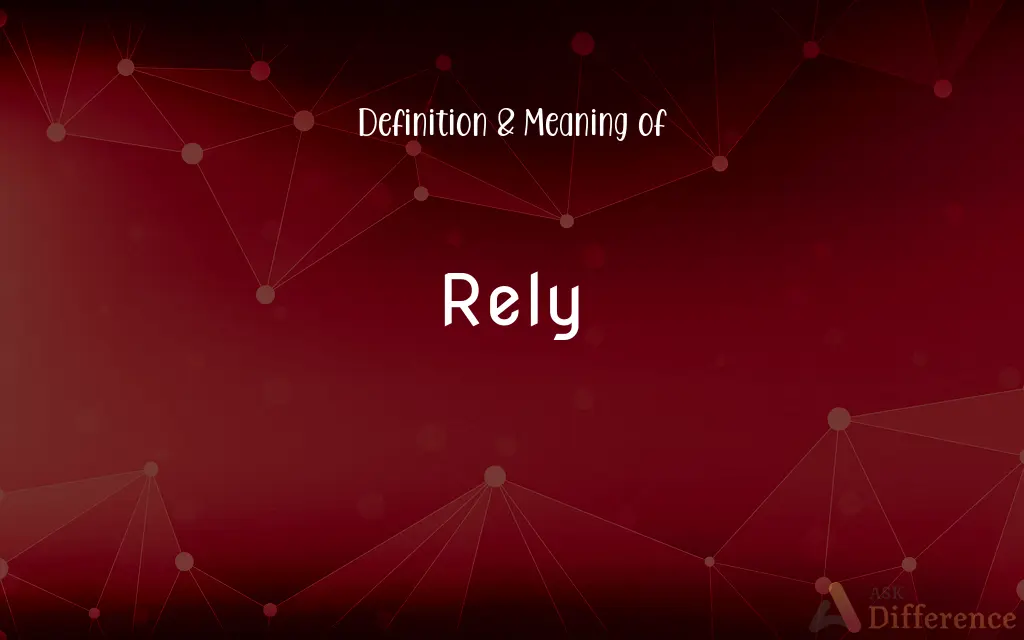Rely Definition and Meaning
By Tayyaba Rehman & Fiza Rafique — Updated on March 5, 2024
"Rely" means to depend on or trust in someone or something for support, help, or maintenance. e.g., She knew she could always rely on her family's support.

Table of Contents
Rely Definitions
Rely refers to counting on someone or something for assistance.
He relied on his map to navigate the forest.
Rely means to depend confidently; put trust in.
You can rely on me to keep your secret.
Rely denotes the act of entrusting something important.
She relied on her memory to recall the details.
Rely can describe trusting someone's abilities or character.
She relied on her teacher's expertise for the project.
Rely describes having confidence in something or someone.
They relied on the weather forecast for planning the trip.
Rely can mean to lean on, especially for emotional support.
He relied on his friends during difficult times.
Rely is used for needing support or resources from something or someone.
The team relied on their coach's guidance.
Rely can refer to having faith in something's reliability or truth.
You can rely on this book for accurate information.
Rely pertains to being dependent on something or someone.
Plants rely on sunlight for growth.
To be dependent for support, help, or supply
Relies on her parents for tuition.
To place or have faith or confidence
Relied on them to tell him the truth.
To trust; to have confidence in; to depend.
To rest with confidence, as when fully satisfied of the veracity, integrity, or ability of persons, or of the certainty of facts or of evidence; to have confidence; to trust; to depend; - with on, formerly also with in.
Go in thy native innocence; relyOn what thou hast of virtue.
On some fond breast the parting soul relies.
Have confidence or faith in;
We can trust in God
Rely on your friends
Bank on your good education
I swear by my grandmother's recipes
Rely involves depending on something for success or survival.
Businesses often rely on customer feedback for improvement.
Rely Snonyms
Depend
Be controlled or determined by.
Their daily operations depend on the weather conditions.
Bank on
Depend on (something) occurring.
He's banking on a promotion to pay off his debts.
Count on
Rely on someone or something to provide what is needed.
You can count on me to support your decision.
Believe in
Feel sure of the truth of.
They believe in the project's potential for success.
Lean on
Rely on someone for support, especially in a difficult situation.
She leaned on her friends for emotional support during the divorce.
Trust
Believe in the reliability, truth, ability, or strength of.
I trust my team to complete the project on time.
Put one's faith in
To trust or believe in someone or something completely.
She puts her faith in traditional medicine.
Resort to
Turn to and adopt (a strategy or course of action, especially a disagreeable or undesirable one) so as to resolve a difficult situation.
We may have to resort to hiring a consultant.
Confide in
Trust (someone) enough to tell them of a secret or private matter.
He confided in his brother about his plans to move abroad.
Fall back on
Use as a last resort when other things have failed.
If the plan fails, we'll fall back on our savings.
Rely Idioms & Phrases
Rely on instinct
To trust one's intuition or gut feelings.
Lost in the forest, she had to rely on instinct to find her way back.
Rely on someone's word
To trust what someone says or promises.
I have no contract, so I have to rely on his word that he'll pay me.
Rely on one's laurels
To be complacent or satisfied with past achievements rather than seeking further success.
Despite his early career success, he didn't just rely on his laurels.
Rely on a safety net
To depend on a system or plan that offers protection against failure or harm.
Many people rely on the government's safety net during tough economic times.
Rely on one's own resources
To depend on oneself or one's own abilities and possessions.
Stranded on the island, he had to rely on his own resources to survive.
Rely on hearsay
To trust information received from other people, which may not be reliable.
You shouldn't rely on hearsay to form your opinion about someone.
Rely on precedent
To depend on decisions made in the past to guide current actions or decisions.
The judge decided to rely on precedent in making his ruling.
Rely on technology
To depend heavily on electronic or digital devices and systems.
Modern businesses increasingly rely on technology to operate efficiently.
Rely on the kindness of strangers
To depend on the goodwill of people one does not know.
Without any money or contacts in the city, she had to rely on the kindness of strangers.
Rely on teamwork
To depend on the collaborative effort of a group to achieve a goal.
To win the championship, we'll have to rely on teamwork.
Rely on expert advice
To depend on the guidance or recommendations of specialists.
For this legal matter, we'll need to rely on expert advice.
Rely on one's strengths
To depend on one's own abilities or talents.
In this competition, you'll need to rely on your strengths.
Rely on a hunch
To trust a personal intuition or suspicion.
Without concrete evidence, the detective had to rely on a hunch.
Rely on a promise
To trust that someone will fulfill what they have committed to do.
She could only rely on his promise that he would return.
Rely on outside help
To need assistance from others not directly involved in a situation.
To complete the project on time, we had to rely on outside help.
Rely on a steady income
To depend on a consistent and reliable source of money.
With a family to support, he needs to rely on a steady income.
Rely on a friend
To trust a friend to provide support or assistance.
When times are tough, it's important to know you can rely on a friend.
Rely on public opinion
To depend on the views or beliefs of the general populace.
Politicians often rely on public opinion to guide their policies.
Rely on manual labor
To depend on physical work done by humans, rather than machines.
In traditional farming, one must rely on manual labor.
Rely Example Sentences
Farmers rely on rain for their crops.
She learned to rely on her instincts.
We rely on the internet for information.
He could always rely on his grandmother's advice.
Students rely on their teachers for learning.
Doctors rely on medical tests for diagnosis.
We rely on maps when traveling to new places.
She had to rely on public transport to commute.
They had to rely on each other in the competition.
Athletes rely on regular training to improve.
You can't always rely on good weather for a picnic.
I rely on my alarm clock to wake up on time.
The city relies on the dam for water.
Birds rely on their wings to fly.
Many people rely on coffee to start their day.
Common Curiosities
Why is it called rely?
"Rely" is called so because it comes from the Latin "reliare," meaning to bind back or fasten, implying a sense of trust and dependence.
What is a stressed syllable in rely?
The second syllable, "ly," is the stressed syllable in "rely."
How do we divide rely into syllables?
"Rely" is divided into syllables as re-ly.
How many syllables are in rely?
There are two syllables in "rely."
What is the root word of rely?
The root word of "rely" is the Latin "reliare."
What is the first form of rely?
The first form of "rely" is "rely."
What is the singular form of rely?
"Rely" itself is the singular form as it is a verb.
How is rely used in a sentence?
Example: "You can rely on me to complete the project on time."
What is the third form of rely?
The third form of "rely" is also "relied."
What is the pronunciation of rely?
Rely is pronounced as /rɪˈlaɪ/.
What is the opposite of rely?
The opposite of "rely" could be "distrust" or "disregard."
Is rely an adverb?
No, "rely" is not an adverb.
What is the verb form of rely?
"Rely" itself is a verb form.
Is rely a vowel or consonant?
"Rely" is a word, not a vowel or consonant. However, it starts with the consonant 'r'.
Is rely a countable noun?
"Rely" is not a noun; it's a verb, so it is not countable.
Is the word rely is imperative?
"Rely" can be used in the imperative form as a command or request, e.g., "Rely on your instincts."
What is the plural form of rely?
"Rely" does not have a plural form as it is a verb.
Is the rely term a metaphor?
"Rely" can be used metaphorically to describe a state of dependence or trust in various contexts.
Is the word rely Gerund?
The gerund form of "rely" is "relying."
Which determiner is used with rely?
As a verb, "rely" typically doesn't use a determiner.
Which preposition is used with rely?
Prepositions like "on" or "upon" are commonly used with "rely," depending on the context.
What is the second form of rely?
The second form of "rely" is "relied."
What part of speech is rely?
"Rely" is a verb.
What is another term for rely?
Another term for "rely" is "depend."
Is rely a noun or adjective?
"Rely" is a verb.
Is rely a collective noun?
No, "rely" is not a collective noun.
Which conjunction is used with rely?
Conjunctions such as "and," "but," or "or" can be used with "rely," depending on the sentence structure.
Which article is used with rely?
As a verb, "rely" does not typically require an article.
Is rely an abstract noun?
No, "rely" is a verb, not a noun.
Is rely a negative or positive word?
"Rely" is generally considered a positive word, as it implies trust and reliability.
Is the word “rely” a Direct object or an Indirect object?
"Rely" is a verb and thus can neither be a direct nor an indirect object.
Which vowel is used before rely?
The choice of vowel before "rely" depends on the preceding word in a sentence.
Share Your Discovery

Previous Term
Husky Definition and Meaning
Next Term
Punctuality Definition and MeaningAuthor Spotlight
Written by
Tayyaba RehmanTayyaba Rehman is a distinguished writer, currently serving as a primary contributor to askdifference.com. As a researcher in semantics and etymology, Tayyaba's passion for the complexity of languages and their distinctions has found a perfect home on the platform. Tayyaba delves into the intricacies of language, distinguishing between commonly confused words and phrases, thereby providing clarity for readers worldwide.
Co-written by
Fiza RafiqueFiza Rafique is a skilled content writer at AskDifference.com, where she meticulously refines and enhances written pieces. Drawing from her vast editorial expertise, Fiza ensures clarity, accuracy, and precision in every article. Passionate about language, she continually seeks to elevate the quality of content for readers worldwide.

































